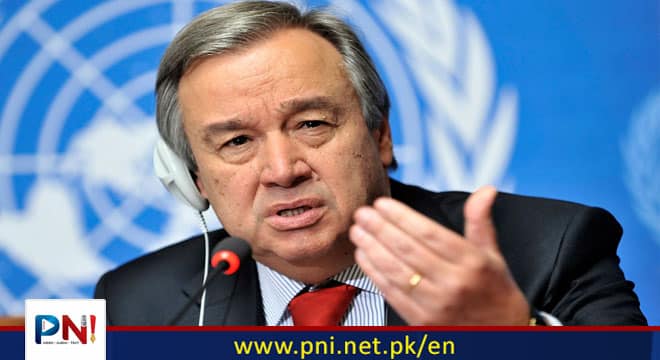UNITED NATIONS, Dec 15 (APP): While some of the world’s poorest countries are welcoming refugees “with great hospitality”, the international community must match that generosity with far greater solidarity, UN chief António Guterres said on Friday. Speaking at the closing of the Global Refugee Forum in Geneva, the Secretary-General said that protection and help for these most vulnerable of people was “an obligation shared by all of humanity”.
He was speaking after three days of intensive activity geared to finding solutions and building partnerships, which saw pledges from multiple stakeholders that have the potential to generate “a bright burst of light” for the millions displaced worldwide. Pakistan was represented at the Forum by Ambassador Asif Durrani, Special Representative for Afghanistan. He highlighted that even after four decades, Pakistan was still hosting 1.4 million Afghan refugees — shouldering its global responsibility of hosting, protecting, and assisting refugees. “We reaffirm this pledge to Afghan refugees, who enjoy equal access to basic facilities of life at par with Pakistani citizens.,” he told the Forum, the world’s largest international gathering on refugees and host communities.
“This is despite the fact that like many other developing countries, Pakistan continues to grapple with the triple crises of food, fuel and inflation,” Ambassador Durrani said. “We sincerely hope that the international community will continue to demonstrate its responsibility by providing sustained and adequate support to Pakistan as a host country,” he added. In his remarks, the UN chief stressed that resources to support refugees are “under enormous strain”, especially in the Global South which bears a disproportionate amount of the burden. He noted it had been a year of “intense political division, conflict and climate catastrophe” which has pushed record numbers of people to flee. “From the Sahel to Afghanistan, Syria and Yemen – to the DRC, Myanmar and Somalia – to the utter devastation we are witnessing in Gaza,” he emphasized that “humanitarian nightmares” had created and exacerbated the displacement of 114 million people during the year, 36 million of whom are refugees.
Guterres asked not to forget that the statistics represent real people with legitimate hopes and dreams: women and men with skills and ideas, children with plans and ambitions. These are people, he underscored, who have the same rights to safety, food, water, shelter and dignity. And as the refugees deserve every chance at a better future, protection and support should not be a lottery, or a disproportionate burden that falls on a few countries and communities based on geography. “It is an obligation shared by all of humanity,” he declared in his remarks. Guterres praised the commitments made by stakeholders, saying that they ‘breathe life into the great promise of the Global Compact on Refugees not only to support refugees, but to ease pressure on host countries and tackle the systemic issues that cause people to flee in the first place’. Among the key pledges made were commitments to resettlement and community sponsorship. States agreed to resettle one million refugees by 2030, supported by a new global sponsorship fund.
This fund aims to assist an additional three million refugees in accessing third countries through innovative community sponsorship schemes. Refugee participation took centre stage, with more than 100 organizations committed to promoting meaningful engagement by including refugees on governing boards and involving them in decisions that directly impact their lives. Leading tech companies, including Google and Meta, joined forces to produce a Digital Protection pledge. This commitment involves dedicating increased resources to understand, address, and prevent misinformation and hate speech targeted at the communities of displaced and stateless. The collaboration aims to bolster humanitarian responses and ensure the safety and well-being of those affected. States at the forefront of peacebuilding efforts, including Colombia, Egypt, and Norway, supported by the UN Department of Political and Peacebuilding Affairs, pledged to engage with countries of origin. The goal is to address the root causes of displacement and facilitate safe returns by promoting peace and economic development.
Addressing an alarming increase in the risk of trafficking as well as considering alternatives to child detention, Siobhan Mullally, the UN Special Rapporteur – or independent rights expert – on Trafficking in Persons, announced a pledge supported by the UNHCR. It aims to enhance protection mechanisms, mitigating the risk of refugees and migrants to being trafficked. Simultaneously, there was a pledge to find alternatives to end the detention of refugee, asylum-seeking, and migrant children. “By rallying around the needs of refugees at this Forum, you are all providing a bright burst of light in what has been a dark and troubling year,” the UN Secretary-General summed up the Forum’s work, encouraging its participants to ‘to continue matching the courage and resilience of every refugee with our own steadfast commitment to help them rebuild their lives in safety and dignity’.
Follow the PNI Facebook page for the latest news and updates.









